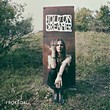|
|

Frøkedal Anne Lise Frøkedal is the vocalist and guitarist from Harry's Gym and I Was A King. She has collaborated with the band Atlanter and artist Hanne Kolstø as (surprise-surprise!) Atlanter, Kolstø & Frøkedal and with old international heroes of ours like Robyn Hitchcock, Sufjan Stevens and Norman Blake (of Teenage Fanclub, Jonny etc.). She also has her own band Familien (The Family) and debuted under her family name with the EP I See You last year. Hold On Dreamer is her first longplayer as a solo artist, but seven of the album's ten tracks is recorded along with Familien, that includes Olav Christer Rossebø (fiddle and mandolin, Erlend Ringseth (keyboards), Thea Glenton Raknes (drums and percussion) and Ingeleiv Berstad (vocals). As with three quarters of I See You and as you might suspect from the band's instrumentation and Anne Lise's musical past, the album is dominated by folk-tinged melancholic pop songs, often close to ballads. Sad folk-pop might be a suitable label, but with some exceptions. The folk label is more due to the arrangements including the fiddle than the melody lines. The best offerings here belongs to this category, including "The Man Who Isn't Here", "Misery", "Cherry Trees", "Demented Times", "Dream" and "Eclipse". I can sense some reverberations of Sandy Denny in Anne Lise's voice in the former two sad little ballads, a great compliment, of course. The latter two are my favourites of the album. "Dream", another sad ballad, with chiming reverbed violins and a bit strange sounding organ that create a fascinating drone effect together with the strings at the start and end of the song sounds as if it stems from the soundtrack of an old romantic movie. Anne Lise has described something about each track of the album to The Line Of Best Fit site. When it comes to "Eclipse" she said: 'I asked Robyn Hitchcock for some help with the lyrics on this track, because I was finding it difficult. He more or less sent my own words back to me after running them through his 'Robyn-filter'. The song was recorded during a day when there was an actual eclipse happening, so it contains an element of doomsday-mood that accompanies such an event.' To me it seems to be far from a doomsday song. It's much more sad and resigned than scary. A dreamy, soft and ethereal ballad, really. Another favourite. The opening track "W.O.Y." and "The Sign" are closer to pure pop, the last one being the only real uplifting, almost happy, song with the most ordinary pop-rock arrangement of them all including profiled drums. A welcomed break. "The Man Who Isn't Here" is somewhere in between, with folk-pop at the start, middle and end and pop in between. Only "Kid" seems out of place on the album, mainly due to the arrangement. Apart from a bit old-fashioned sounding organ it seems very mainstream and AOR'ish, especially in the vocals of the chorus. The drums, sounding like a rhythm box, seems out of place and I don't like the guitar sound either. Unlike the other nine tracks it sounds calculated, constructed more by head than heart. Otherwise the simple but exquisite arrangements and production need to be emphasised. The sound is dominated by the fiddle that sometimes sounds closer to a droning harmonium than strings, keyboards and guitars to some extent. The album contain lots of small details to be explored and enjoyed. The reverbed piano of "Misery", the mighty but still discreet Mellotron between the second and third verse of "The Sign", that strange dizzy choir Mellotron (I think) in between in "Don't Look Back", a Mellotron sound I don't think I've heard earlier. Also the e-bow guitars at the end of "W.O.Y.", the discreet mandolin of "Demented Times", the fiddles of "Don't Look Back" that aren't fiddles anymore, but dynamic violins in a baroque-pop way. The list could go on... Frøkedal's Facebook-site informs that the music is poetic, melodic, often dark, inspired by everything from folk music of the 1960s to Cocteau Twins and Brian Eno's experimental, minimalistic pop. I wouldn't have thought of the latter two names myself, but the more I think about it and listen to Hold On Dreamer, the more sense it makes. Along with the cunning tunesmith abilities of Anne Lise Frøkedal and her Family these ingredients are turned into a characteristic and unique blend. Copyright © 2016 JP
|
| © 2016 Luna Kafé |